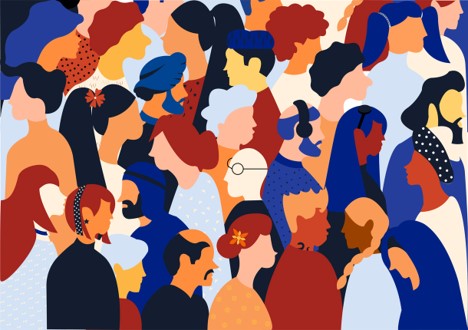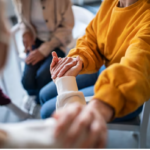“People of color, particularly African Americans, feel the stigma more keenly. In a race-conscious society, some don’t want to be perceived as having yet another deficit.”
Bebe Moore Campbell, author and journalist, commenting about mental health stigma Tweet
In 2008, the U.S. House of Representatives designated July as Bebe Moore Campbell National Minority Mental Health Awareness Month in honor of the leading African American novelist and journalist, who also was an advocate and voice for individuals and families affected by mental Illness.
At Well Being Trust, we are kicking off National Minority Mental Health Month by highlighting issues – including barriers to care, cultural stigma and discrimination – that minority populations experience, and we’re providing information and resources for minority communities.
According to the 2021 Pain in the Nation Report from Trust for America’s Health and Well Being Trust, a higher risk of alcohol-induced deaths, higher suicide rates, and increased drug-induced deaths were reported among the following:
- Alcohol-induced deaths increased by 27% and were highest amongst American Indian/Alaska Native and Asian Communities.
- Although suicide rates dropped 3% overall, suicide deaths increased among American Indian, Black, and Latino people in 2021.
- Overall drug-induced deaths rose in communities of color, among youth ages 17 and under, and in young adults ages 18-34.
Other findings related to minority mental health include:
- More than 80% of Black Americans are genuinely concerned with the stigma around mental health, which then discourages treatment or seeking help of any kind.
- Black and Hispanic youth are 14% less likely than White youth to receive treatment for depression.
- Over 25% of Black youth exposed to violence are at elevated risk for PTSD (post-traumatic stress disorder).
- From 1991 to 2019, self-reported suicide rate attempts rose 80% among Black teens while other races and ethnicities did not change significantly.
Communities of color face an added level of stigma and discrimination when seeking mental health care. This National Mental Health Awareness Month, join Well Being Trust, advocacy groups, communities, and individuals to help break down stigma so no one struggles in silence.
View the information and resources below that provide support to minority populations:
- American Foundation for Suicide Prevention – Supporting Diverse Communities
- Mental Health America’s Beyond the Number BIPOC Mental Health Month Toolkit
- NAMI: Together for Mental Health
- SAMHSA Office of Behavioral Health Equity
- U.S. Department of Health and Human Services Office of Minority Health
- United States Interagency Council on Homelessness: Resources for National Minority Mental Health Awareness Month
Mental health crisis resources
Contact one of the resources below to speak with a trained counselor or get a referral for help in your area.
- Call the National Suicide Prevention Lifeline at 1-800-273-TALK (8255) or En Español at 1-888-628-9454 if you or someone you know is having suicidal thoughts.
- Text HOME to the Crisis Text Line number 741-741 to connect with a crisis counselor.
- The NAMI HelpLine can be reached Monday through Friday, 10 a.m. – 10 p.m., ET.
1-800-950-NAMI (6264) or helpline@nami.org - Call the Substance Abuse and Mental Health Services Administration (SAMHSA) National Helpline at 1-800-622-HELP (4357) for referrals to treatment centers, support groups, and community mental health agencies.






